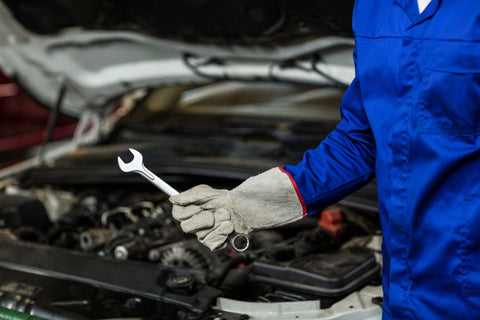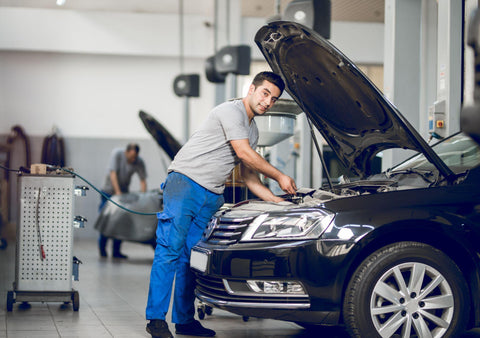The Importance of Regular Maintenance for Your Car Parts - Hunt Parts
Posted by Rashmi Parkhya on
Your car is a complex machine composed of numerous parts working together to provide you with a smooth and reliable driving experience. From the engine and transmission to the brakes and tires, each component plays a vital role in the overall performance and safety of your vehicle. However, like any mechanical system, these parts require regular maintenance to function optimally and avoid costly issues down the road.
In this blog, we will delve into the importance of regular maintenance for your car parts. We will explore why taking care of individual components is crucial for the longevity, performance, and safety of your vehicle.
Whether you're a car enthusiast or simply a responsible car owner, understanding the significance of maintaining your car parts will empower you to make informed decisions about your vehicle's upkeep.
By the end of this blog, you will have a clear understanding of why regular maintenance for your car parts is not just an option but a necessity. So, let's dive in and discover how taking care of your car parts can keep you on the road with confidence and peace of mind.
A. Importance of regular maintenance for cars
Regular car maintenance and repair is crucial for the proper functioning and longevity. It involves a series of routine checks, servicing, and repairs that help keep the vehicle in optimal condition. Here are some key reasons why regular maintenance is important:
Safety: Regular maintenance ensures that all components of the car, such as brakes, tires, steering, and lights, are in good working order. This helps prevent accidents caused by faulty or worn-out parts.
Reliability: By regularly servicing your car, you can identify and address potential issues before they become major problems. This minimizes the chances of unexpected breakdowns and keeps your vehicle reliable and ready for daily use.
Performance: Regular maintenance, including oil changes, filter replacements, and tune-ups, helps keep the engine running smoothly. It improves fuel efficiency, enhances overall performance, and extends the life of the vehicle.
Cost savings: While it may seem counterintuitive, regular maintenance can save you money in the long run. By addressing minor issues early on, you can prevent them from escalating into major and expensive repairs. Additionally, a well-maintained car tends to have better fuel efficiency, reducing your overall fuel expenses.
Resale value: If you plan to sell your car in the future, a well-maintained vehicle will command a higher resale value. Prospective buyers are more likely to be interested in a car that has a documented service history, indicating that it has been properly cared for.
B. Significance of maintaining car parts

Maintaining individual car parts is a critical aspect of regular maintenance. Each part plays a specific role in the overall functioning of the vehicle, and neglecting their upkeep can lead to various problems. Here are some reasons why maintaining car parts is significant:
Prolonged lifespan: Proper maintenance of car parts helps extend their lifespan. For example, regularly changing the engine oil and filter ensures optimal lubrication and reduces wear and tear on the engine components. Similarly, keeping the cooling system in good condition prevents overheating and potential damage to the engine.
Performance optimization: Well-maintained car parts contribute to the overall performance of the vehicle. For instance, maintaining properly inflated tires with adequate tread depth ensures better traction, handling, and fuel efficiency. Similarly, keeping the brakes in good condition ensures quick and efficient stopping power when needed.
Avoiding costly repairs: Neglecting maintenance of specific car parts can result in costly repairs or replacements down the line. For example, ignoring regular inspections and replacements of worn-out brake pads can lead to damage to the brake rotors, necessitating expensive repairs. Regular maintenance helps detect and address such issues before they escalate.
Safety assurance: Each car part has a crucial role in ensuring the safety of the vehicle and its occupants. Regular maintenance helps identify and rectify any potential safety hazards. For instance, maintaining functional headlights and taillights ensures good visibility on the road and alerts other drivers to your presence, reducing the risk of accidents.
Warranty compliance: Many car warranties require regular maintenance to remain valid. Failing to adhere to the manufacturer's recommended car maintenance schedule could result in the voiding of warranty coverage. By maintaining car parts as per the manufacturer's guidelines, you can ensure warranty compliance and avail of potential repairs or replacements covered by the warranty.
Common Car Parts That Require Regular Maintenance

A. Engine
The engine is the heart of your vehicle, and proper maintenance is essential for its longevity and performance. Regular maintenance tasks for the engine include:
- Oil Changes: Regularly changing the engine oil and oil filter helps lubricate the engine, reduce friction, and remove contaminants.
- Air Filter Replacement: The air filter prevents dirt and debris from entering the engine. Regularly replacing the air filter ensures proper airflow and combustion efficiency.
- Spark Plug Replacement: Spark plugs ignite the air-fuel mixture in the engine cylinders. Over time, they wear out and affect engine performance. Regular replacement ensures efficient combustion and optimal engine power.
B. Brakes
The brakes are critical for your safety, and regular maintenance ensures their proper functioning. Important brake maintenance tasks include:
- Brake Pad Replacement: Brake pads wear down over time due to friction. Regular inspection and replacement of worn-out brake pads prevent damage to the brake rotors and ensure effective braking.
- Brake Fluid Flush: Brake fluid absorbs moisture over time, reducing its effectiveness. Flushing and replacing the brake fluid at regular intervals helps maintain proper braking performance.
- Brake System Inspection: Regularly inspecting the brake system for leaks, worn-out components, and proper adjustment is crucial for safe operation. This includes checking brake lines, calipers, and rotors.
C. Tires
Tires are essential for traction, handling, and overall vehicle safety. Regular maintenance tasks for tires include:
- Tire Rotation: Rotating tires at regular intervals promotes even tread wear and extends their lifespan. This ensures balanced handling and optimal performance.
- Tire Pressure Check: Regularly checking and maintaining the correct tire pressure improves fuel efficiency, tire longevity, and enhances vehicle stability and safety.
- Tread Depth Inspection: Adequate tread depth ensures proper traction on the road. Regularly inspecting the tread depth helps identify worn-out tires that need replacement for optimal safety.
D. Battery
The battery provides electrical power to start the engine and run various components in your vehicle. Regular battery maintenance includes:
- Cleaning Battery Terminals: Over time, corrosion can build up on the battery terminals, affecting electrical conductivity. Regular cleaning helps ensure a solid connection and optimal battery performance.
- Battery Load Test: Periodically testing the battery's load-carrying capacity helps determine its overall health and whether it requires replacement.
- Inspection and Replacement: Regularly inspecting the battery for signs of damage, leakage, or deterioration is important. If the battery is nearing the end of its lifespan or shows signs of malfunction, it should be replaced promptly.
By regularly maintaining these crucial car parts, you can ensure their optimal performance, extend their lifespan, and contribute to the overall safety and reliability of your vehicle.
Importance of Professional Maintenance
A. Expertise and specialized equipment
Professional maintenance for your car offers the advantage of expertise and access to specialized equipment. Certified technicians undergo training and have in-depth knowledge of various car models, systems, and components. They are equipped with diagnostic tools and equipment specifically designed for automotive maintenance and repair. Their expertise allows them to identify and address issues accurately, ensuring proper maintenance and minimizing the risk of further damage. Professional maintenance ensures that your car receives the attention it needs from knowledgeable professionals who can provide efficient and effective solutions.
B. Timely identification of potential issues
Professional maintenance often includes comprehensive inspections that go beyond routine checks. Technicians are trained to detect early signs of potential problems that may not be apparent to the untrained eye. By identifying these issues early on, professionals can address them promptly, preventing them from escalating into more significant and costly repairs. Regular professional maintenance allows for proactive maintenance rather than reactive fixes, helping you avoid unexpected breakdowns and ensuring the reliability of your vehicle.
C. Warranty considerations
If your car is under warranty, following the manufacturer's recommended maintenance schedule is crucial. Professional maintenance performed by authorized service centers helps ensure compliance with warranty requirements. Many warranties require proof of regular maintenance to remain valid. By relying on professional maintenance, you can have peace of mind knowing that your warranty coverage will not be compromised. Additionally, professional service centers often have access to genuine parts and have a better understanding of warranty terms and conditions, ensuring that your vehicle remains eligible for warranty repairs and replacements if needed.
DIY Maintenance Tips for Car Owners

A. Regularly checking fluid levels
One of the essential DIY maintenance tasks is regularly checking the fluid levels in your car. This includes engine oil, transmission fluid, coolant, brake fluid, and power steering fluid. Each fluid serves a specific purpose and plays a vital role in your car's performance and longevity. Refer to your owner's manual for the correct procedure to check these fluid levels and ensure they are at the recommended levels. If any of the fluids are low, top them up as per the manufacturer's guidelines. Regularly monitoring and maintaining proper fluid levels help prevent damage to vital components and keep your car running smoothly.
B. Inspecting and replacing air filters
Air filters play a crucial role in keeping your engine and cabin air clean. Over time, they accumulate dirt, debris, and other contaminants, which can affect engine performance and air quality inside the car. Regularly inspecting and replacing air filters is a simple but important DIY maintenance task. Refer to your owner's manual for the location of the air filters and instructions on how to replace them. Typically, engine air filters should be replaced every 12,000 to 15,000 miles (or as per manufacturer recommendations), while cabin air filters are usually replaced every 15,000 to 30,000 miles. Clean air filters promote better engine performance, fuel efficiency, and provide cleaner air for you and your passengers.
C. Cleaning and maintaining the exterior
The exterior of your car requires regular cleaning and maintenance to protect the paintwork and preserve its appearance. Here are some DIY maintenance tips for the exterior:
- Wash the car: Regularly wash your car to remove dirt, grime, and contaminants. Use a car wash soap and a soft sponge or microfiber cloth. Avoid using harsh household detergents or abrasive materials that could damage the paint.
- Waxing: Applying wax to your car's exterior helps protect the paint from UV rays, oxidation, and minor scratches. Waxing also gives your car a glossy finish. Follow the instructions on the wax product for the best results.
- Tire care: Check tire pressure regularly and ensure they are inflated to the recommended levels. Inspect the tires for signs of wear or damage and replace them when necessary. Clean the tires and apply a tire dressing for a clean and shiny appearance.
- Cleaning windows and mirrors: Clean the windows and mirrors with a glass cleaner and a lint-free cloth. Ensure proper visibility by removing any streaks or smudges.
- Protect from the elements: If you park your car outside for extended periods, consider using a car cover to protect it from sunlight, rain, and other environmental factors that can damage the paint and exterior.
